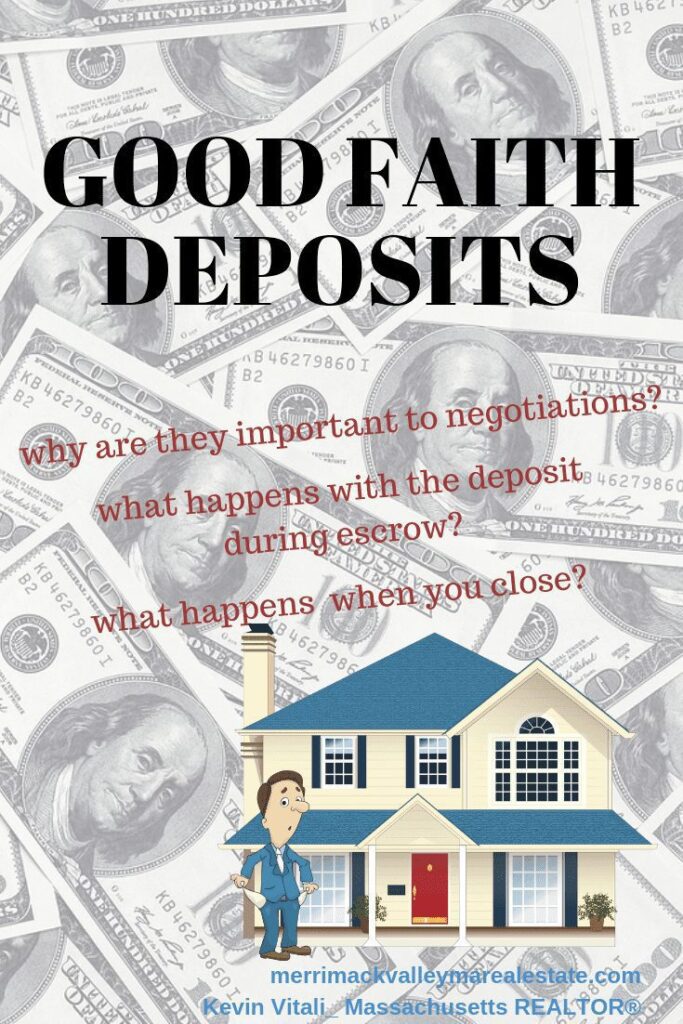 Serving my local real estate community for many years, I find their is some confusion around the good faith deposit. We will dive into the good faith deposit and explain what it is and why it is important to dispel the confusion.
Serving my local real estate community for many years, I find their is some confusion around the good faith deposit. We will dive into the good faith deposit and explain what it is and why it is important to dispel the confusion.
Much of the confusion revolves around the good faith deposit and what it is, especially when buying your first home. Additional confusion also revolves around what happens with the good faith deposit during the escrow period and when you close on your home.
Down Payment Money
First take a look at what the down payment is in a real estate transaction.
When people reference the down payment they are talking about the money that is required by the bank to secure the loan. Sometimes you will hear people use the term deposit for down payment. Hence the confusion.
A minimum down payment for a home mortgage can be as little as 3-5%, with there are few programs like the VA loan that will allow you to put no money down, to 20% or more on high risk borrowers or properties. A down payment is usually required by the bank to show that a borrower has the ability to save and they have some skin in the game. Your down payment will be your initial equity in a home.
The down payment of your home mortgage will be paid to the bank at the day of the closing and has nothing to do with your good faith deposit you submit with a contact.
Good Faith Deposit
The good faith deposit can go by many names like escrow money deposit, earnest money deposit, etc… but they are all the same thing. I like to call it the good faith deposit, because that helps to differentiate it from the down payment.
The good faith deposit is money you tender on a home when making an offer. It actually has nothing to do with your down payment.
Where the confusion for buyers can come in, is sometimes the word deposit is thrown around for either the down payment or the good faith deposit and for some buyers putting down 5% or less the good faith deposit may be the same amount as the down payment.
Your good faith deposit, is earnest money you have held in an escrow account to show you are putting an offer in based on, well …….. your “good faith” in completing the transaction and closing on the home.
Why Do I Need a Good Faith Deposit? Put up or Shut up!
Think about good faith. You are asking seller to take their home off the market for anywhere from 30-90 days for you to secure financing and take possession of their property. The seller takes far more risk by accepting your offer than you do.
When you make an offer you submit a small deposit of typically $500 to a $1000 to bind the offer.
And, when the purchase and sale is signed, another good faith deposit is usually negotiated to bring the total of the deposits to 5% of the purchase price is made. 5% is a what we see industry wide as a standard, but it could be anything you, the home buyer, decides and the seller is willing to accept.
Some home buyers fail to understand the importance of the good faith deposit and want to try to tie up a sellers home with very little money.
Generally, the thinking is 5% of the purchase price will cover any costs the sellers have incurred if you default on the purchase.
The good faith deposit is putting your money where your mouth is and it shows your are willing to put some skin in the game.
When writing an offer the good faith deposit shows the seller how serious you are. For example if you are buying a $500,000 home, general convention would dictate your good faith deposits would total $25,000.
Some home buyers fail to understand the importance of the good faith deposit and want to try to tie up a sellers home with very little money. But as a seller, with all things being equal, would you take an offer that had a $25k deposit or a $2k deposit?
I think the answer is clear, you would take the larger deposit. The buyer is showing you they are serious and putting their money where their mouth is. It is much easier for a buyer to walk away from a two thousand dollars rather than twenty five thousand earnest money deposit.
Don’t cheap out on your good faith deposit if you are serious about buying a home and especially if you are competing with other buyers.
Market conditions will also dictate what you can get away with when negotiating a home. In a strong sellers market you need to step up with your good faith deposit. When the buyers market rears its head you can certainly be more demanding as a buyer an risk less money with your deposits.
Sellers Incur Cost’s If You Default
If you default the sellers may lose significant money. They have put deposits down on movers, possibly done repairs at your request based on the home inspection, put a deposit on another home or an apartment all of which they will lose if you don’t close.
In the state of Massachusetts, buyers deposits are considered a seller’s only recourse and they cannot sue for specific performance or damages.
This is why your good faith deposit can be a negotiating point and important to the seller.
Is My Good Faith Deposit At Risk If You Don’t Close?
The first thing to know about good faith deposits is at some point during the transaction, if you can’t close on a property, you risk losing your good faith deposit.
Their are several contingencies in place to help you protect your good faith deposit. I won’t go into great depth on real estate contingencies here but I will cover a few common ones quickly. The most common contingencies in most standard contracts are:
Home Inspection Contingency– A home buyer has a certain amount of time to conduct inspections on a home. If the inspection is deemed unacceptable to the buyer, the contract is null and void and all deposits are returned.
Mortgage Contingency– A home buyer has approximately 30-45 days to secure commitment from a lender to lend on a home. If a buyer cannot secure financing on the home upon notification the contract becomes null and void and all deposits money will be returned to the buyer.
Note that contingencies generally have a deadline with very specific ways they are handled. By not following the contract specifics, you could default on your contract, putting all of your deposit money at risk. Read your contract or better yet, work with a Massachusetts Buyer’s Agent to manage deadlines and contracts.
After all contingencies are met, your good faith deposit held in escrow is at risk of being lost.
What Could Happen?
Realize most purchases close and all is fine. On occasion a buyer has defaulted and lost their deposit. It is usually because of the buyer jeopardizing their financing. Even though you have a commitment to lend from the bank there are things you can do as a buyer to revoke your financing or circumstances that prevent you from closing. Here is a list of the top 3 that we see that we see:
- Lose your job- A lender will verify your employment the day of your closing. No job, no loan.
- Change in credit- Your lending commitment is based on a minimum credit score. If your lending profile changes and lowers your credit score you will lose your commitment.
- Change of mind or circumstances- Buyers get cold feet or have circumstances that can change making the purchase a burden, so they don’t end up closing.
What Happens With My Good Faith Deposit During Escrow?
Your good faith deposit first of all will be held in an escrow account (hence the term escrow money deposit) of the typically the listing agent or an attorney. The concept of an escrow account is it is held by a third party. Laws and the actual contract govern the deposit monies to protect the parties interest in the good faith deposit. Read your contract!!
First an escrow agent (real estate brokerage) must hold the money in a separate escrow account where funds are not intermingled with the brokerage’s money. A broker will have a surety bond to help protect the money.
Lastly, it is important to understand what your contract says about the release of escrow monies. Most Massachusetts contracts will state that an escrow agent cannot release escrow funds unless both parties are in agreement. If a dispute should arise your money will not be released unless there is a court order and in many case your escrow money will be turned over to the state until all the issues are resolved.
Final Accounting
The second area of confusion for most buyers is what happens to the escrow money when you close on your new home. Money held in escrow for your good faith deposit is applied towards your transaction at closing.
Take a $500,000 purchase. You are putting 5% of the purchase price as a down payment and you are paying $7800 in closing costs. You have put 5% or $25,000 into an escrow account as a good faith deposit.
| Purchase Price | $500,000 |
| Closing Costs | + $7,800 |
| Total | = $507,800 |
| Amount Financed from the bank | – $475,000 |
| Total Buyer Needs to Bring to Closing | = $32,800 |
| Good Faith Deposit Held in Escrow | – $25,000 |
| Actual Cash Needed From Buyer After Applying Escrow | = $7,800.00 |
At the end of day your good faith or escrow money deposit is distributed to the closing attorney to credit the amount of money that is needed for you to complete the transaction. In some case like 100% financing or other low money down loan programs you may actually receive money back if your down payment and closing costs combined are less then your good faith deposit.
Recap Of Good Faith Deposits
Your good faith deposit is not the down payment for your loan. It is earnest money to show a seller you are serious about buying their home. As a matter of fact your good faith deposit can show strength in your offer.
Make sure you fully understand the laws and your contract regarding your good faith deposit because at some point during the transaction your money does become at risk. If that should happen to default on a contract, consult an attorney so you understand your rights.
- Joe Boylan The Cost of Buying a Home
- Petra Norris Write a Winning Offer
- Bill Gassett Top Home Buying Tips
- Kyle Hiscock Buying A Home With a Low Down Payment- Pro’s and Con’s
_______________________________________________________________________________
This post, Good Faith Deposit Explained, was provided by Kevin Vitali of EXIT Group One Real Estate. Kevin is happy to answer any of your questions regarding the sale or buying of a home and can be reached at 978-360-0422 at anytime.
Real Estate Services in the following areas: Northeast Massachusetts, Merrimack Valley, North Shore and Metrowest. Including the following communities and the surrounding area- Amesbury, Andover, Billerica, Burlington, Chelmsford, Dracut, Groveland, Haverhill, Lowell, Melrose, Merrimac, Methuen, Middleton, North Andover, North Reading, Reading, Stoneham Tewksbury, Tyngsborough, Wakefield, Wilmington, Westford





